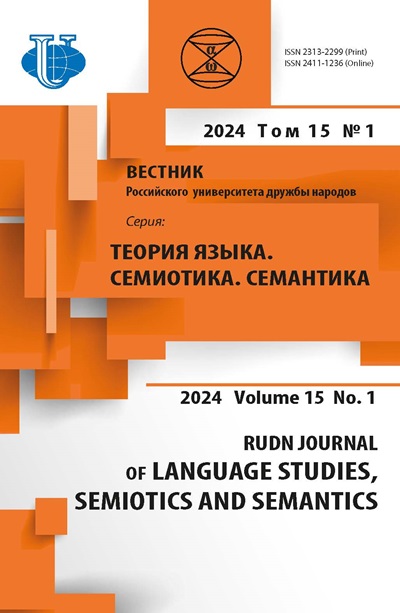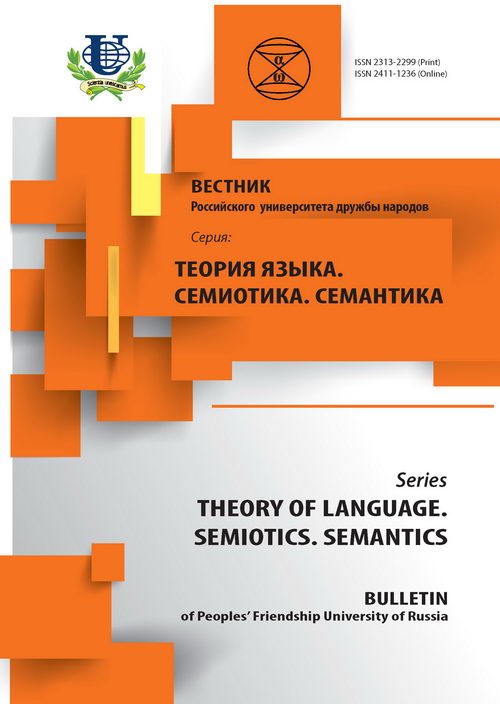No 4 (2012)
- Year: 2012
- Articles: 18
- URL: https://journals.rudn.ru/semiotics-semantics/issue/view/449
Articles
Editor’s address
RUDN Journal of Language Studies, Semiotics and Semantics. 2012;(4):5-6
 5-6
5-6


The Perception of F.D. E. Schleiermacher’s Concept in the Russian Philosophy of the First Half of the XIX century
Abstract
The article deals with the perception of a personality and the concept of the German philosopher and theologian Fr. Schleiermacher in the Russian philosophy of the first half of the XIX th century. There is evidence of P.J. Chaadayev and I.V. Kireyevsky being aware of the texts by Fr. Schleiermacher as well as their evaluation of his personality and world view. Proceeding from the evidence, the author of this article reveals the main features of the first period of perceiving Fr. Schleiermacher’s ideas in Russia, and a conclusion follows that on the whole the novelty of his views was not understood and stayed underestimated.
RUDN Journal of Language Studies, Semiotics and Semantics. 2012;(4):7-12
 7-12
7-12


The Origins of Morphonology (Morphonology in the studies of the Moscow Phonological School scientists)
Abstract
Morphonology as an independent linguistic discipline evolved at the turn of the XIX—XX centuries due to the studies and writings of philologists and linguists, who had revealed and stated the phoneme and morpheme as abstract units of language system. Not coincidentally, this discipline was based on the theory of phonetic alternations as both units demonstrated deep interaction and vivid variations in respect to their sound form.
RUDN Journal of Language Studies, Semiotics and Semantics. 2012;(4):13-18
 13-18
13-18


Stylistic Function of Occasional Words in Composition and Speech Patterns in Skaz “Levsha” (Left-Hander) by N.S. Leskov
Abstract
First-person narrative (skaz) as a special genre uses occasional words to characterize narrator’s speech. In Leskov’s “Levsha” (Left-Hander) occasional words show the attitude of the narrator towards what he describes, express more complicated shades of meaning rather than create a substandard speech pattern of the narrator.
RUDN Journal of Language Studies, Semiotics and Semantics. 2012;(4):19-25
 19-25
19-25


Poetics of F. Iskander’s Novel «Sandro from Chegem»
Abstract
This article is about creating F. Iskander’s novel «Sandro from Chegem». We analyzed the problem of attributing the novel to the genre of novel on the whole and the genre of picaresque novel. We tried to study the structure of the novel and characterize the protagonist.
RUDN Journal of Language Studies, Semiotics and Semantics. 2012;(4):26-30
 26-30
26-30


Cultural Markedness of Foreignisms in a Literary Text
Abstract
The study of functional peculiarities of a foreignism in a literary text can reveal the peculiarities of a culture perception in a given language community. The purpose of the article is to analyze pragmatic functions and difficulties of deciphering cultural meanings of words and expressions from structurally different languages in literary texts of contemporary English-language fiction.
RUDN Journal of Language Studies, Semiotics and Semantics. 2012;(4):31-36
 31-36
31-36


Lexical-and-Semantic Field «Clothing» in the Aspect of Comparative Linguocultural Studies
Abstract
The studies carried out within a novel scientific approach — comparative linguocultural studies and is devoted to the building and analysis of lexical-and-semantic field «Clothings» in Russian, English and German. The purpose of the article is to reveal and analyze the linguocultural peculiarities this lexical-and-semantic field in the aspect of comparative linguocultural studies.
RUDN Journal of Language Studies, Semiotics and Semantics. 2012;(4):37-44
 37-44
37-44


 45-49
45-49


Toponymic Nominations of the English-speaking Canada as Symbols of Culture
Abstract
Toponymic nomination of the English-speaking Canada are treated in the article as cultural samples or symbols, which form the image of English speaking Canadians as well as the models of perception of the country’s geography.
RUDN Journal of Language Studies, Semiotics and Semantics. 2012;(4):50-56
 50-56
50-56


Emotive Component of Spanish News Media Discourse
Abstract
The article deals with emotive component of news media discourse, its pragmatic objectives, and means of emotional transfer, reviews convergent and divergent characteristics of televisual discourse in the Iberian Peninsular and Latin American national variants of the modern Spanish language.
RUDN Journal of Language Studies, Semiotics and Semantics. 2012;(4):57-62
 57-62
57-62


On Addressing in Communication
Abstract
The article treats the topic of addressing proceeding from kinship terms in the communicative events. Another aspect of it, is comparative study of addressing in English and Turkish that helps to reveal similarities and differences in semantics and pragmatics of kinship terms in languages compared.
RUDN Journal of Language Studies, Semiotics and Semantics. 2012;(4):63-68
 63-68
63-68


Word-building Patterns in Neologisms-Loanwords in Russian and Chinese
Abstract
The article treats structural methods used to form neologisms-Anglicisms as well as their assimilation in Russian and Chinese. There are being analyzed lexical units coined according to major patterns of modern English: contaminated words with partial phonetic juxtaposition, contaminated words with abbreviation, contaminated words implying three or more abbreviated components with partial phonetic juxtaposition . The Internet resources facilitate the generating of neologisms-occasionalisms-internationalisms in typologically and structurally different languages
RUDN Journal of Language Studies, Semiotics and Semantics. 2012;(4):69-75
 69-75
69-75


Contrastive Analysis of Russian-Polish Consonantism
Abstract
The article deals with the aspects to present phonetic and phonological systems of The Russian and Polish languages. At the same time similarities and differences in the two languages compared reveal both universal and unique, specific characteristics in course of assimilation of Russian and Polish consonants.
RUDN Journal of Language Studies, Semiotics and Semantics. 2012;(4):76-81
 76-81
76-81


Bank Terminology Specifics in the field ‘Investor Relations’ in Russian and English
Abstract
The article treats general trends and specifics of banking terms in the field of IR in Russian and English. The adaptation of English terms by the Russian banking terminology is being demonstrated alongside with the functioning of the speech means conservation law.
RUDN Journal of Language Studies, Semiotics and Semantics. 2012;(4):82-86
 82-86
82-86


Names of Metrological Lexical Units in Thai and Russian
Abstract
Nationally specific component of lexical unit meanings is determined by special division of reality and outer towards language, extra linguistic factors, which is confirmed in course of contrastive research of metrological units in the Russian and Thai languages.
RUDN Journal of Language Studies, Semiotics and Semantics. 2012;(4):87-91
 87-91
87-91


Pankin V.M., Filippov A.V. Language contacts: a concise dictionary. — M.: Flinta; Nauka, 2011. — 160 p
RUDN Journal of Language Studies, Semiotics and Semantics. 2012;(4):92-98
 92-98
92-98


The International Scientific Conference “The Interaction of Literatures in the Global Literary Process. Theoretical and Historical Poetics” September, 17—19 th, 2012, Belarus, Grodno, The Grodno State University n.a. Ya. Kupala The International Scientific Conference «W Kręgu problemów antropologii literatury (Świat człowieka w literaturze: metodologiczne aspekty badań problematyki antropologicznej — in the field of anthropology of literature (Man’s World in Literature: Methodological Aspects of Investigating Anthropological Topics)” September, 20—22 nd, 2012, Poland, Bialystok, The Bialystok University, The Institute of East-Slavonic Philology
RUDN Journal of Language Studies, Semiotics and Semantics. 2012;(4):99-100
 99-100
99-100


Our autors
RUDN Journal of Language Studies, Semiotics and Semantics. 2012;(4):101-102
 101-102
101-102
















